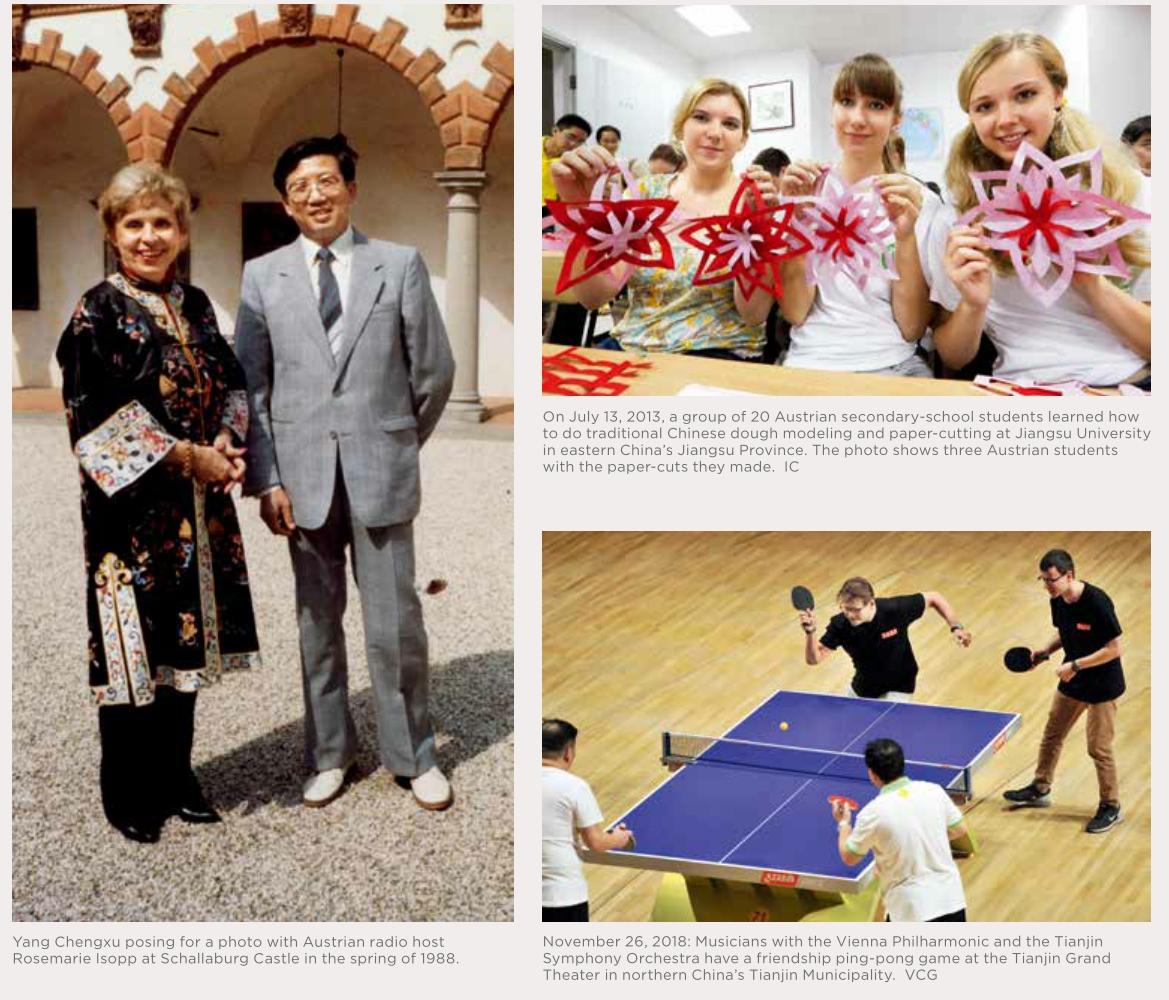Yang Chengxu Making Friends and Winning Hearts
2019-11-04byHuZhoumeng
by Hu Zhoumeng

In the spring of 1988, the popular Austrian radio program Turnier auf der Schallaburg (Tournament at the Scallaburg) featured its first Chinese guest in Schallaburg Castle about 100 miles west to Vienna. He was a diplomat. On the live program, then-Chinese Ambassador to Austria Yang Chengxu had a vivid dialogue with host Rosemarie Isopp. Their back-and-forth drew applause and laughter from some 300 spectators in attendance.
After the show, people across Austria knew of “Chinese Yang.” To Yangs surprise, he received a letter from Einzi Stolz, wife of the late composer Robert Stolz, which read:“Congratulations on the show. Your performance was the best episode Ive ever heard. You must have won many hearts.”
“Due to ideological differences, some Westerners had prejudices about China,” Yang remarked. “I considered it a good chance for them to see what a Chinese was really like.”
Extensive Contact and EqualFooting Exchange
Yang accepted the post of Chinese Ambassador to Austria in September 1985. At that time, as a move to further implement the reform and opening-up policy, Chinese diplomats were encouraged to meet people from all walks of life and introduce Chinas policies and stances.
Before then, Chinese diplomats rarely made contact with local media in the countries where they were stationed. Yang became an exception. He accepted every interview invitation whether for TV, radio, newspaper or magazine. In an interview with Kapital magazine, Yang thoroughly explained Chinas progress in reform and opening up and remarked that “China also needs to learn from capitalist countries” in terms of enterprise management and economic development.
“After China launched its reform and opening up, people in the West had a lot of questions about China,”Yang recalled. “Diplomats should serve national interests by actively introducing Chinas foreign policy and economic development with an eye on local conditions. But its not easy.” During his tenure in Austria, Yang regularly visited leaders of political parties including the Social Democratic Party of Austria, the Austrian Peoples Party, the Austrian Green Party and the Freedom Party of Austria. Yang established intimate relations with them, whether from the governing or opposition parties.
“Sandwiched between Eastern and Western Europe, Austria is a fairly neutral country, which is less impacted by major powers,” Yang added. “I found it easier for the Austrian government to understand and support Chinas stances in international affairs. China always defends justice in international society and opposes power politics and hegemony, which has won it support from most countries. Such philosophies matter for Chinas diplomacy.”
42-Year-Old “Rookie”
Yang reached a major turning point in his life at the age of 42 when he became a diplomat.
In 1972, the Peoples Republic of China established diplomatic relations with the Federal Republic of Germany. Chinas Ministry of Foreign Affairs suddenly needed more diplomatic professionals who could speak fluent German and understand German culture. The same year, drastic changes happened to international situations. After U.S. President Richard Nixons visit to China, China-U.S. relations became normalized and an increasing number of European countries established diplomatic relations with China.
Becoming a diplomat sounded attractive to Yang. “I had studied Germany and its language, literature, history and philosophy in college, and I wanted to learn more about the country. Also, serving my country as a diplomat is an honorable job.”
Yangs first stop as a diplomat was the Chinese embassy in the Federal Republic of Germany. Yang found everything fresh. “Advertisements for Volkswagen Beetles were everywhere, but back in China people still used ration stamps to buy food and other commodities. I could easily see an enormous difference between China and abroad before the country launched its reform and opening up.”
Back then, one of Yangs duties was reading news for the members of the embassys Party committee every morning, including local news, developments on Chinas relations with the host country and the general international situation. Every day he stayed up late researching a broad range of local newspapers, radio and TV reports to prepare for the next days news reading. He still keeps a dozen thick notebooks recording his research from those years.
“I conducted extensive research during my stay at the Chinese embassy. It is quite fascinating and valuable to study the politics, economics, culture and diplomacy of the country where you are stationed. It helps the diplomatic work tremendously.”